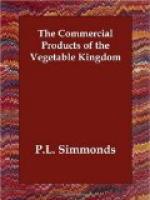Castor oil is used for lamps in the East Indies, and the Chinese have some mode of depriving it of its medicinal properties, so as to render it suitable for culinary purposes.
That which we import from the East Indies comes from Bombay and Calcutta, and is obtained at a very low price. It is exceedingly pure, both in color and taste.
In the West Indies the shrub grows about six feet high. The stalks are jointed, and the branches covered with leaves about eighteen inches in circumference, forming eight or ten sharp-pointed divisions, of a bluish green color, spreading out in different directions. The flowers contain yellow stamina; the seed is enclosed in a triangular husk, of a dark brown color, and covered with a light fur, of the same color as the husk. When the capsule is thoroughly ripened by the sun, it bursts, and expels the seeds, which are usually three in number.
In Jamaica this plant is of such speedy growth, that in one year it arrives at maturity, and I have known it to attain to the height of twenty feet. A gallon of the seed yields by expression about two pounds of oil.
The wholesale price in Liverpool, in October, 1853, was 3d. to 5d. per lb.
It is brought over from the East Indies in small tin cases, soldered together and packed in boxes, weighing about 2 cwt. each.
In Ceylon castor oil is obtained from two varieties of the plant, the white and the red.
The native mode of preparing the oil is by roasting the seed; this imparts an acridity to the oil, which is objectionable. By attending to the following directions, the oil may be prepared in the purest and best form. The modes of preparation are—1. By boiling in water. 2. By expression. 3. Extraction by alcohol. In the first the seeds are slightly roasted to coagulate the albumen, cleaned of the integuments, bruised in a mortar, and the paste boiled in pure water. The oil which rises on the surface is removed, and treated with an additional quantity of fresh water; 10,000 parts of clean seed give by this process (in Jamaica) 3,250 of oil, of good quality, though amber-colored. 2. Expression is the simplest and most usually adopted process; the cleaned kernels are well bruised, placed in cloth bags, and compressed in a powerful lever and screw press. A thick oil is obtained, which must be filtered through cloth and paper to separate the mucilage. In Bengal the manufacturers boil the oil water, which coagulates some albumen, and they subsequently filter through cloth, charcoal, and paper. 3. The extraction by alcohol is practised by some druggists. Each pound of paste is triturated with four pounds of alcohol, specific gravity 8.350, and the mixture subjected to pressure. The oil dissolved by the alcohol escapes very freely: one half is recovered by the distillation of the spirit, the residue of the distillation is boiled in a large quantity of water. The oil separates and is removed, and gently heated to expel any adherent moisture; then filtered at the temperature of 90 deg. Fahrenheit; 1,000 parts of the paste have by this process given 625 of colorless and exceedingly sweet oil.




